Gaza Strip 18 April 2005
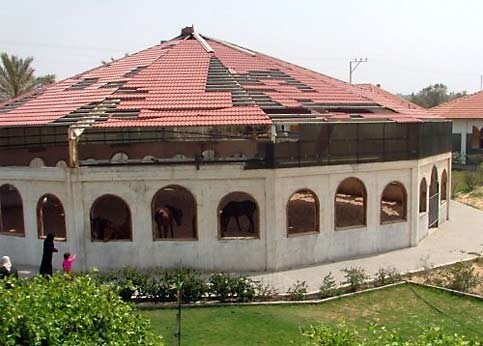
Broken tiles cover the roof of the winter hall and cracks mark the walls as the result of an Israeli F-16 raid on the nearby Palestinian coastal police. (Photo: Sami Abu Salem/WAFA)
GAZA, 14 April 2005, (WAFA) — The neighing of horses and the chirping of sparrows break the silence covering the Palestine Horsemanship Club (PHC) along the Gaza shore. Broken tiles cover the roof of the winter hall while cracks mark the walls.
Silence and gloom have replaced the cheers of the crowds that used to be heard during the local competitive horse riding championships.
The Director of PHC (in charge of the Ministry of Youth and Sport), Youssef al-Diqs, was out observing the horses and the stablemen. He is proud of the elegant horses, particularly the $1 million Arabian horse, Manar.
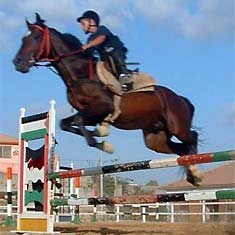
Mohannad Siam, 9, from Gaza, finished first in the championship of horsemanship for children in Gaza. (Photo: Sami Abu Salem/WAFA)

The elegant Arabian horse Manar, in PHC Gaza, cost $1 million. (Photo: Sami Abu Salem/WAFA)
Al-Diqs spoke of the challenges faced by Gaza’s equestrian community, especially the Israeli restrictions. “The IOF prevents us from participating in the international or regional championships, I do not understand why,” he said. “They prevent us from taking our horses abroad, and sometimes they bar riders also.”
The Israeli restrictions also curb the Palestinian care of horses. “Three horses died in Israeli attacks. One was killed with shrapnel when Israeli F-16s bombarded the nearby coastal police compound in 2002, two mares suffered miscarriages, and most of the others went into trauma,” says al-Digs. He added that the IOF prevented access of advanced medics and special food for horses. “Five other horses died of various diseases.”
“During the times of the Israeli siege, stablemen risked their lives for the sake of the horses. They used to have to ‘infiltrate’ the stable to feed the horses and check their living conditions.” Al-Diqs said. “300 riders have graduated after training from the PHC since the establishment of the club in 1996, which also offers 12 specialized courses for police forces.”
“But,” he painfully added, “all such activities were curtailed with the beginning of Israeli attacks”.
“We try to keep the club alive, through organizing short championships or training courses. Our success depends on how much the Israelis reduce their attacks on Gaza”, he added.
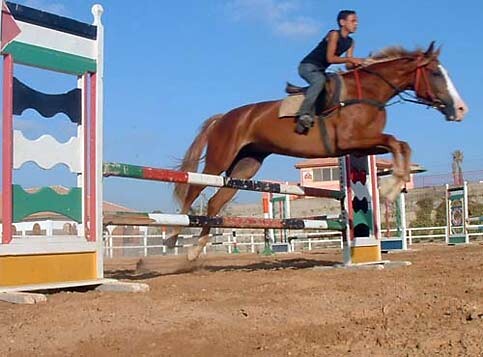
Yousef Al-Mamlok, 14, on the mare Sabah during training in Gaza. (Photo: Sami Abu Salem/WAFA)
Al-Digs recalled that the PHC passed through a “flourishing period”, when the horsemen participated in celebrating the late President Arafat’s birthday and other national occasions.
He expressed his hope that donors will pay more attention to developing Palestinian equestrian sports through reconstructing the PHC and rehabilitating the trainers, as well as pressuring Israel to allow Palestinian horses to travel abroad and participate in international championships.
In Al-Farouq Club (less than 1km from the Israeli colony of Duggit, in Beit Lahia, north of Gaza), Omar al-Mamlok was busy training three teenagers.
He said that, in the 1990s, he trained hundreds of girls and boys but the number strongly dropped as the trainers became afraid to travel to the club because of the nearby Israeli presence, in addition to their own difficult economic conditions. “In September 2004, our riders could not participate in a competition in Algeria, because Israel prevented them from leaving Gaza.”
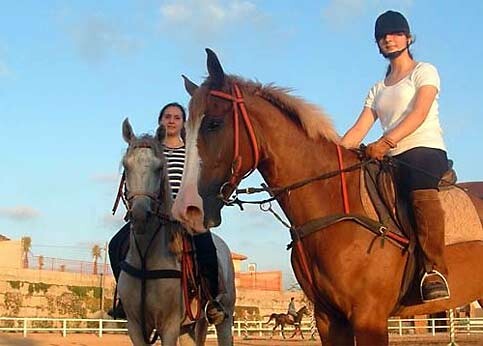
Palestina Jaber, 15, from Gaza, thinks that riding horses provides her with courage and a positive attitude for studying. (Photo: Sami Abu Salem/WAFA)
Two sisters, Eve, 18, and Palestina Jaber, 15, were trained in equestrian riding four years ago. “I love horses very much. I feel I can not live without riding horses, it is a part of my life. It is in my blood, I also like painting, I always paint horses in my books,” said Eve.
She does not hide her frustration because of the shortage of equipment and trainers, while Palestina said that riding horses gives her courage and a positive attitude for studying.
Once, when the two girls and their father tried to visit the club, they could see in the distance Israeli troops positioned on the main road leading to it. To avoid being harassed by them, the father wanted to go back home but the two girls cried and begged him to go on. In a decision familiar to all Palestinians who need to travel through the occupied land, he chose instead to drive the hilly and dusty back roads to reach the club.
The two sisters expressed their hope one day to raise the flag of Palestine in an international championship.
9-year-old Mohannad Siam is one of the most skillful riders in the club. He says that in the future he will buy a horse and would like to be a trainer. “Last July, I won the championship of horsemanship for children in Gaza. I came in first and I will keep myself first for as long as I live.”
It was obvious that Akram Omar, 16, is a well-trained rider. He catches the eyes of trainers as he leaps over hurdles while riding the white horse called Al-Sadeq. Akram began practicing equestrianism four years ago and he is nominated to participate in the Arab Championship in Saudi Arabia next month.
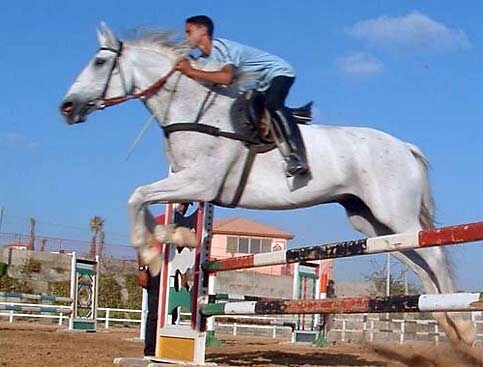
Akram Omar, 16, on Al-Sadeq, hopes the Israelis will allow him to travel with his horse to Saudi Arabia to participate in the Arab Championship this May. (Photo: Sami Abu Salem/WAFA)
“I hope the Israelis allow me and my horse to travel,” he said, “I think, as usual, they will allow me and prevent the horse and, no doubt, I will lose.”
The late Minister of Energy, Azzam al-Shawwa, was once carefully listening to the trainer (al-Mamlok), before riding his red horse. “We love equestrianism,” he said. “We love and respect horses. We have a special relationship between us and them, which originated in our Arab culture.”
Related Links





